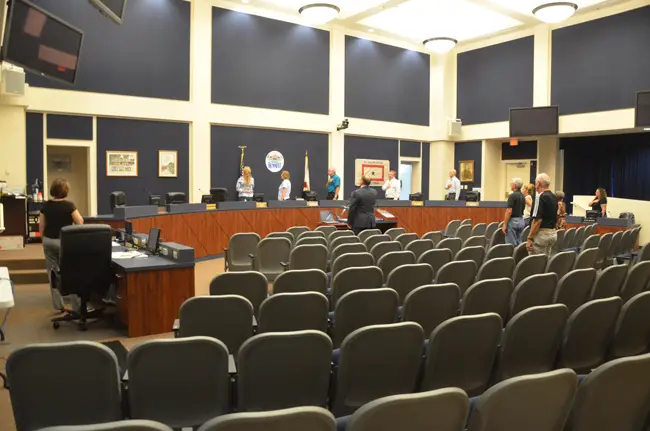
Promptly at 2:30 this afternoon the Bunnell City Commission started an unusual Saturday meeting to interview four candidates over the next five hours to fill the city manager’s job, soon to be vacated by Armando Martinez.
The four, in the order in which they were to be interviewed: Douglas Drymon, until August a deputy city manager in Leesburg; Perry Mitrano, Bunnell’s solid waste director; Lawrence Williams, a former city manager of Belle Isle and a Palm Coast resident; and Judi Stetson, Bunnell’s grants and Community Redevelopment Agency director. A fifth candidate, Alvin jackson, could not make it. Four of the five commissioners hadn’t wanted to interview Jackson. Commissioner John Rogers insisted that he be included.
Monday evening commissioners will return to a commission meeting at which they will have ranked today’s candidates, from 1 to 4, making it likely that the commission may have a final choice by then. (Jackson, who is in Africa, may yet be interviewed by Skype Monday evening at 9 p.m., )
The candidates are to answer a set of 20 written questions prepared in advance, and that were to have been made available to the candidates ahead of time. Drymon, the first candidate on the list, had not received the questions before his interview.
The interviews were taking place in the chamber of the Government Services Building, where the commission usually holds its meetings, with commissioners sitting in their usual seats on the dais and the candidate facing them, standing up, at a podium. Attendance was slight. It included ex-city commissioners Daisy Henry and Pete Young, County Commissioner Charlie Ericksen, Bunnell Fire Chief Derek Fraser, two Bunnell city staffers and a half dozen citizens.
Other candidates were asked to wait outside the chamber.
Bunnell Mayor Catherine Robinson started the proceedings with a Christian prayer.
A summary of each candidate’s interview will post here, as close to the conclusion of each interview as possible.
Douglas Drymon
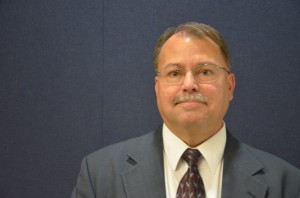
He described his management style as “participatory” rather than “authoritative” (he meant authoritarian, since a city commission would likely want its manager to be quite authoritative), then continued to answer questions with calm authority and self-assurance on a broad range of issues. He was soft-spoken and even-keeled, providing long, at times analytical answers to every question, with examples drawn from his experience, but with modesty. Almost an hour into the interview, when he said that his tendency not to promote himself may be one of his weaknesses, he was only saying what had become clear by then.
On several occasions he drafted the involvement of the commission in various responsibilities. He explained his approach to sharing information, stressing that in one-on-one briefing he would not be providing one commissioner any information he would not provide another. “Not to sound crass about it but that is the bread and butter of a city manager city commission relationship,” he said. At the same time, “communication is a two-way street.” In one case he pointed at the commissioners and said they “have a hand” in the hiring of staff, at least in so far as it’s the commission’s job to set tone and expectations (but not to do the actual hiring). He tells his staff that it’s the staff’s job is to help him look good. “My job,” he said, pointing at the commission again, “is to help those five people up there look good.” He values a good attitude more than he does complete “skill sets.”
He was not above verging on lecturing the commission, as he did on matters of the public demeanor and pronouncements of commissioners, which he said in this day and age end up documented on the web for all to see—and for, say, prospective companies to weigh in their decisions when considering to relocate or set up shop somewhere. He did not sound too thrilled about social media, and advised commissioners on developing a policy about social media. “Unfortunately a lot of it can get you in trouble,” he said. “Even if it’s off the clock, it can still come back and haunt the city,” when city employees are engaged in such things. “That’s probably the reason I don’t do Facebook and Twitter.”
Rogers asked him point blank what he would do if he asked him to hire one of his close friends or relatives. Drymon may have been taken aback by the question, like a student thrown a cureveball of a word at a spelling bee. He reverted to the classic delaying tactic, asking Rogers to repeat the question, then answered carefully, first speaking of giving the candidate “due consideration,” then building toward more categorical points to show his distaste for the situation. “The signals that that sends ethically—I would certainly hope that that would never happen,” he said. “The can of worms you just opened up as a city manager is going to haunt you as long as you work for the community, and I personally think that would not be very long.” He concluded: “From the community’s standpoint you’ve lost a huge, huge amount of respect and I would respectfully decline to do that.”
He’s not big on staff meetings. He’s not against privatization, but he would be cautious about it, especially if it’s only a matter of bottom lines. He cautioned commissioners against taking him for a magician who can solve all their problems. “I hope that won’t be my expectation, if it is maybe you need to seek another candidate,” he said.” “I left my magic wand at home.”
One disappointment in Leesburg, he said, was a case three years ago he came up with the concept of an energy and technology air park (“I still think it’s a great concept”). He thought he had the full support of the city commission. He didn’t. He blamed the press, among other causes for the project never getting off the ground. “While I’n very pleased with what I did,” he said, “it’s only now that they’re getting serious about that project.” And only because Duke Power is putting money behind it.
Drymon left no doubt as to what he was looking for, and conveyed the impression that he was looking for a goof fit for himself as much as the reverse. “I’m looking for a group of people who can work together,” he said. If that’s not going to be the case, “you’ll do me a disservice if you hire me, because I’m going to be disappointed.”
Drymon made not a single joke, made no attempt to ingratiate himself with or flatter commissioners except for, before the meeting, introducing himself and shaking their hand, and doing so again at the end of the interview.
Robinson asked most of the questions, with Commissioner Bill Baxley asking a few and John Rogers asking just the one about hiring. Commissioners Elbert Tucker and Jeny Crain-Brady asked no questions or follow-ups.
Perry Mitrano
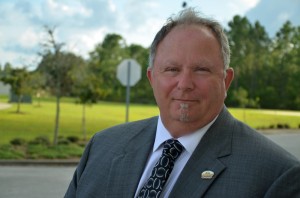
Perry Mitrano was one of two candidates who needed no introduction to the commission, being its solid waste director. Still, he had a challenge ahead of him. He has no experience as an executive in government except for the last four years, and none as city manager, though he’s had executive experience in the private sector. He’s worked with other solid waste companies in Florida and New York previously. And he’s had his own businesses along the way.
“I love the business and I love working for you all,” he said. “Companies considered me the trouble shooter, they used to love to send me to fix problems.” He would take the heat, he would get it done, and when he would, the company would sell. He said he’s had hundreds of employees answering to him, and was “always the last man standing,” as he would be sent to close a place, to fire people. “It was difficult but I still did it.”
He started his interview with a surprise—the first surprise of the day: he volunteered a lot of the information that answers questions considered “illegal,” if commissioners were to ask them. He said he’s a third-generation American of Italian-American descent, in excellent health, “with no health issues to report, except I’m 55.” He spoke of his wife, his family, his 29-year-old son’s upcoming wedding in May, the fact that both his parents have died. He noted that last detail by means of assuring commissioners that he would not be distracted by such things as having to care for older parents. He spoke of his “forever” home in Palm Coast. “We are embedded in the community,” he said. “I’m not prejudice in any way, I look at everyone as an equal,” he said, then noted that one of his weaknesses is that he takes certain things personally, but that he commands respect among his staff.
Unlike his predecessor at the dais, he read many of his answers from prepared notes, having had access to the questions since earlier this week. That had him looking down at the notes a good part of the time, as opposed to—as Drymon had—looking the commissioners in the eye from beginning to end.
He described himself as a “participative,” “democratic” manager who holds a Thursday breakfast meeting with his drivers. “I like to know that I have your confidence so if you do you’ll vote for what my plans are,” he said. “And I’m not a it’s my way or the highway type of manager.” He spoke literally when he said that he leads by example, and that he’s not afraid to get his hands dirty: Mitrano drives the city’s garbage truck and carries out garbage runs as his other drivers do, at times on Christmas. “Bottom line is, if I have to go in, I go in.”
He acknowledged that he may “bond” with one commissioner better than with another, but stressed that he would share information equally and transparently with commissioners, while ensuring that his own directors would be heard, whether their issues are positive or negative. Memos and emails would be his method “so that media can get it and read about it and make sure that we’re not conspiring to do something wrong.”
The minute he gets in, he’d look at long-term goals, what’s achievable, what’s not, revisiting certain issues. He cited a concern: city debt. He spoke of having a long-term strategic plan. “I want to make sure that everybody is happy, I want to make sure that everybody is happy with their job,” he said. “If there’s something is wrong, or if somebody spoke out of turn, we’ve got to nip it in the bud.” He spoke of the complaint calls commissioners get, and that it is the administration’s responsibility to anticipate. He wants a “competent, aggressive staff.”
When asked what Bunnell’s challenges are, Mitrano said: “That’s a wow for me.” He said he thought about that question quite a bit. “We lack the resources but we still have big-city problems,” he said, citing clean water, infrastructure, wastewater, debt. The current debt “could bankrupt the city,” he said. “This is no joke.” He said whoever gets the job has to be sure that everything we do is both funded properly and continues to carry us forward so that we can maintain the same service levels than big-city levels, and that’s difficult. So grants, rants are very important.” But not enough, he said. “If you’re just going to wait for grant money to get another fire truck, the fire truck is just going to age out.”
His frustrations? Lazy employees who are in it just for the paycheck. One personal disappointment he spoke of echoed the theme of the energy air park Drymon had talked about: in both cases, the answer was crafted to underscore a willingness to innovate and think creatively. In Mitrano’s case, it was a scheme to convert tires into diesel oil. The project never caught on, because at the time it cost more to make the stuff than to sell it, back when gas was 47 cents a gallon. The disappointment still rankles, Mitrano says.
Aside from Baxley, who asked Mitrano to rate himself on a scale from 1 to 10 in terms of experience regarding various sectors of city management (he gave himself a 4 to 5 on law enforcement, though he has no law enforcement experience), none of the commissioners asked questions other than Robinson.
Like Drymon, Mitrano had kept it straight most of the interview, addressing every question with straight-forward—if more general rather than specific—answers that never meandered or lost their focus, or touted his own horn. He was far more deferential than Drymon, not once aiming either a finger or a piece of advice to the commission that employs him. Toward the end of the interview, Mitrano said: “Probably one of my proudest moments in my professional career is being here today.” And he did say that of the 80-some applicants the commissioners had received, he considered himself “the most operational savvy.” When asked when he could start, he replied immediately: “I could kick it in high gear Monday if you like.”
Lawrence Williams
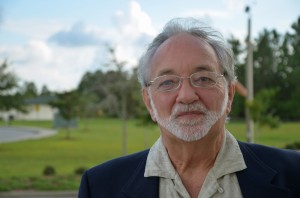
The saddest day of his life was when he left that job. “Residents cried. I cried,” he said. But he had a grandson who became sick back in New Jersey. Family comes first, he said, using words familiar to the commission after its six years with Armando Martinez: one of the issues with Martinez was that he was a long-distance manager who lived in Brevard County, and commuted there every day. Now Williams says he’s bored. He wants to work. “I want to work until the day I die,” he said, and feels he can be “a big player for the city.”
Williams spoke without notes, at ease with himself in a conversational manner that, of the three candidates who had appeared before the commission until then, appeared the most conversational, the least buttoned-up. And the most prone to surprise. Toward the end of the interview, he had the commissioners’ rapt attention when he spoke of the manager’s budget.
“I know the city manager’s budget. I had to pick myself off the floor when I saw it,” Williams said. He said if he was offered the job, he would take it for just “a couple of thousand dollars more than the highest paid person,” or what would equate to less than $70,000. He doesn’t need the money, but doesn’t want to work for nothing, either. He said there were a lot of other items attached to the budget that are “ludicrous.” He added: “I’m offering you my background, my talent, for about $67,000 a year.”
Martinez’s salary was a recurring issue, especially in the last few years. He was hired at $90,000 a year, was earning $112,000 this year, and refused to go back below $90,000 when a majority of commissioners agreed to keep him on only if his contract was renegotiated. But hat majority would not give Martinez more then $76,000. Williams’s surprising revelation also contrasted with Mitrano’s, who had made a point of saying that one of the reasons he was seeking the job was for the better pay. The job was advertised as being in the $70,000 to $80,000 range.
Williams came across clearly as the best prepared, most experienced and self-assured of the candidates, at least objectively speaking. But politically, he would have to overcome the inside-track candidacy of Judi Stetson.
Williams described himself as “a doer” who gets out with his employees during emergencies, and a manager who’s not “a hard person to work for” and one who is easy to work for. “The day I left Belle Isle,” he said for the second time during the interview, “my staff was in tears, the mayor was in tears,” though he doesn’t get buddy buddy with his staff because “you never known when you may have to reprimand a member of the staff.” He described his relationships with former city commissioners as “excellent,” and, in a detail that must have pricked up Mayor Catherine Robinson’s ears—she likes her city managers to be in close reach—he said his main communications were with the mayor. (On the other hand, Commissioners Rogers, Baxley and Tucker are interested in a manager who does not favor one member of the commission over another.)
His priorities: Get the city’s Community Redevelopment Agency (the downtown redevelopment zone) “moving.” He described it as “a very expensive document just to sit on a shelf.” Intended or not, that may have been a criticism of Judi Stetson, one of Williams’s competitors among the finalists—and the director of the city’s CRA.
Rogers asked Williams the question he’d asked Drymon—what he would do if a commissioner asked him to hire a friend or a relative. “It really depends,” Williams said. “I have to look at your charter first. For example the charter in Belle Isle has a specific clause against nepotism.” If Bunnell’s doesn’t, he’d open the position and hire the most qualified person. Williams’s answer wast short and to the point, contrasting with Drymon’s in one regard: in comparison, Drymon’s had the ring of grand-standing.
Baxley asked the question he’d asked Mitrano—rate yourself on a scale of 1 to 10 on various city management responsibilities. Williams gave himself a 10 on law enforcement, because he was a police commissioner in New Jersey and had a police department working for him as city manager. In public works, he gave himself a 10, recalling how Belle Isle was in the cross-hairs or the devastating hurricane season of 2004, which included Hurricane Charlie and Frances, and had him working 45 days without power. He gave himself high marks for public works, which also combined solid waste. (Belle Isle contracted for fire and rescue services.)
Williams had no hesitation when asked about Bunnell’s biggest challenge: money, he said. The city’s properties are losing value or being abandoned or not being occupied by new businesses. “I said money jokingly, but the economy is the money, and if the economy isn’t being driven properly, the municipalities aren’t getting the money.” Grant funding is not enough, he says. “Congress isn;t going to get us anything. I’d be very surprised if CDGB will survive in the next three or four years,” he said, referring to the federal government’s Community Development Block Grant program. His own proudest achievement? Working through the hurricanes of 2004. “We didn’t lose a life, we didn’t send one person to the hospital,” he said, citing the cooperation of people who “came out of the woodwork” and the luck he experienced. He also spoke humbly of the obstacles he’s had in his way, though he said: “I don;t look at anything in my life that wasn’t there for a reason.”
“I like to talk, I communicate, I pride myself on my communications,” Williams said, displaying an occasional quick wit, and a willingness to do homework: he’d gone through Bunnell’s budget line by line, and made suggestions about it. That’s when he mentioned the manager’s budget.
“I like the fact that you’re not afraid to get down in the ditches or get up on a piece of equipment,” Rogers told Williams at the end of the interview.
Judi Stetson
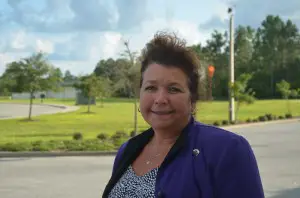
“The part that you need to understand is that I’m here, I’ve been here,” Stetson said, with her imprint on city business every day, and with staffers seeking out her guidance every day as she leads by example and through research. “Everyone here knows and trusts me and you know what kind of product I provide each and every day.”
When Mayor Catherine Robinson asked Judi Stetson what she knows about the City of Bunnell, Stetson went into presentation mode—just as she would have, had she been sitting a few steps away from the dais during the bi-weekly commission meetings, when she submits her reports. She spoke about the achievements of the week, the city’s closing on the purchase of the Plantation Bay utility with the county, the county’s closing on the old hospital (in which Bunnell is not involved, but the property is located in the city and its transformation will have ramifications for Bunnell). And she went on to describe with a measure of details some of the challenges the Plantation bay acquiasition has led to, including this very week’s water failures that left Plantation Bay residents temporarily without water.
Stetson said she is the only candidate who has no learning curve, “and I think that’s something that really needs to be looked at, because it’s taken me tears to build the trust with each commissioner” and officials beyond the commission. She spoke of establishing a strategic plan in the first three months, with the commission and the manager agreeing to a unified direction.
Stetson was not shy about flattering the commission, crediting “you guys” for having the “vision” to take the city where it’s been going, and describing the five years she’s spent there as the proudest of her career. She said she’s already earned the trust and respect of commissioners, and knows how to keep them in the loop, as well as keeping staff in check “as to what the situation is and what they’re duties are and what they’re allowed to go forth and to discuss.”
Asked when she would you be available to start working for the city, she said: “Five years ago”
Stetson’s was the last interview, and the most hurried—whether because it was past 6 p.m. or because Robinson appeared ready to run through it wasn’t clear. Stetson provided brief answers, many of them circling back to the theme she set out from the start (stressing her own familiarity with city issues), and Robinson fired question after question in such a way that Stetson was at the dais less than 30 minutes, almost half the time devoted to the previous three candidates. The segment left the impression that it was more of a pro-forma than a genuine interview, though as in previous segments, other commissioners, with Baxley’s exception, asked no questions.






























Jon Hardison says
Go Perry! :-)
Big Mike says
Hope the Commission does what is best for Bunnell, not for themselves. Perry Mitrano is my personal favorite, but Judy Stetson is also viable. How about co-city managers?
Anonymous says
Looks pretty scary……Bunnell is in sad shape.
Dean says
If nothing else, it is clear that Bunnell is in need of someone capable to lead.
Perry Mitrano seems like the obvious choice. While some of the other candidates have their perks, Perry has and still does seem readily engaged in the taking on this role with his own style and flair. He doesn’t have the time-served advantage that others may have had, but he doesn’t seem to use that as a crutch either.
This article would have you believe his lack of eye contact was a downfall compared to drymon, but any logical person would see that it was his preparedness that lead to that. If anything, he clearly had put way more time in to considering his answers than im sure most people would have.
Judi seems like a great candidate as well, but what concerns me is the clear shortening of her interview process. Either it was strictly a formality, which i hope isnt the case, or she gave such clear answers that it wasnt necessary to keep the average length of the 3 past interviews. Hopefully it was the lattet and not the former.
Lawrence seems to have some charisma but his stratedgy to undercut his opponents seems a bit stranges to me. Not quite sure what to make of it.
Nothing about Drymon struck me as a man I’d like to see hired.
That said, I personally hope Perry is chosen. He seems readily engaged in the city and its future on both a professional and personal level. His candor with the city really made me believe he was an open book.
tulip says
Lawrence Williams had a really good financial background, as well as serving many years in city government and appears to be concerned about getting Bunnell into good financial shape.
The commissioners that were interviewing kept asking the candidates about favoritism and hiring or doing what the commissioners wanted. Although Judi Stetson has a far better knowledge of Bunnell, I think maybe she might be part of the good ol boy system and not exactly impartial to a lot of things.
Sometimes hiring an “outsider” with a clean slate is better, JMO
steve d says
in my years of being in around business the candidate that I would choose would be perry mitrano…..for reasons beingH he presented a down to earth presentation…also mr mitrano was prepared with great notes…if I was hiring a city manager I would be looking for the younger candidate and someone who needs to work and earn money everyday…the least of my pics would be mr Williams where he does not need the position being he is retired and always having family issues as in the past… MR WILLIAMS COULD LEAVE THE CITY AND PLACE THE CITY IN CHAOS